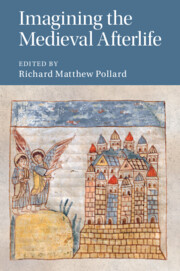Book contents
- Imagining the Medieval Afterlife
- Cambridge Studies in Medieval Literature
- Imagining the Medieval Afterlife
- Copyright page
- Contents
- Figures
- Contributors
- Preface and Acknowledgements
- Abbreviations
- Imagining the Medieval Afterlife: Introduction
- Part I Chronological Surveys
- Part II Theological Perspectives
- Chapter 8 Purgatory’s Intercessors: Bishops, Ghosts, and Angry Wives
- Chapter 9 The Theology of the Afterlife in the Early Middle Ages, c. 400–c. 1100
- Chapter 10 Afterdeath Locations and Return Appearances, from Scripture to Shakespeare
- Part III Artistic Impressions
- Part IV Notable Authors and Texts
- Bibliography
- Index
- Cambridge Studies in Medieval Literature
Chapter 9 - The Theology of the Afterlife in the Early Middle Ages, c. 400–c. 1100
from Part II - Theological Perspectives
Published online by Cambridge University Press: 07 December 2020
- Imagining the Medieval Afterlife
- Cambridge Studies in Medieval Literature
- Imagining the Medieval Afterlife
- Copyright page
- Contents
- Figures
- Contributors
- Preface and Acknowledgements
- Abbreviations
- Imagining the Medieval Afterlife: Introduction
- Part I Chronological Surveys
- Part II Theological Perspectives
- Chapter 8 Purgatory’s Intercessors: Bishops, Ghosts, and Angry Wives
- Chapter 9 The Theology of the Afterlife in the Early Middle Ages, c. 400–c. 1100
- Chapter 10 Afterdeath Locations and Return Appearances, from Scripture to Shakespeare
- Part III Artistic Impressions
- Part IV Notable Authors and Texts
- Bibliography
- Index
- Cambridge Studies in Medieval Literature
Summary
Between AD c. 400 and c. 1100, Christian ideas about the afterlife changed in subtle but important ways. This chapter outlines broad trends in thought about the afterlife in this period in the Latin West, and examines the concomitant changes in thinking about the post-mortem fates of souls. Ongoing contemporary discourse around topics such as sin and penance or baptism contributed to developments in the way that contemporaries understood the afterlife, including heaven, hell, and an interim state between death and universal judgement. Significantly, as Christians came to be more certain about some aspects of the afterlife, the possibility of salvation for individual souls was perceived to be less certain. As a result, by the end of the period there is much greater evidence for concern about the post-mortem fate of the soul than there had been at the beginning, laying the foundations for high medieval theological discussions and developments.
- Type
- Chapter
- Information
- Imagining the Medieval Afterlife , pp. 153 - 175Publisher: Cambridge University PressPrint publication year: 2020
- 1
- Cited by

